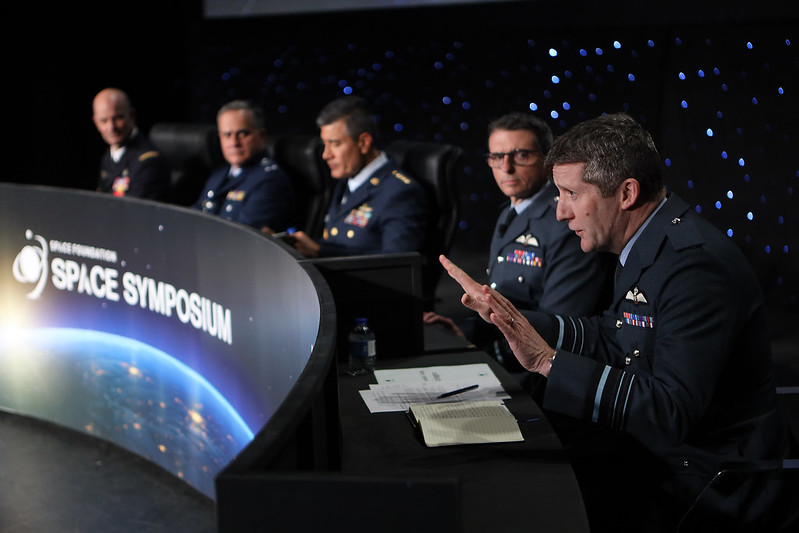Latest News

International military leaders speak at Space Symposium 2024. Photo: Space Foundation
COLORADO SPRINGS, Colo.— International military collaboration is critical to ensure the safety and security of space, a panel of military space force and space command leaders from six different countries emphasized in a discussion at Space Symposium in Colorado Springs, Colorado on April 9. The U.S. is in a leadership position for initiating and developing collaborations, with the United Nations looking to take on a bigger role.
“Our network of allies and partners is a strategic advantage and one that we should not take for granted,” said Maj. Gen. Brian Gibson, director of Strategy, Plans, and Policy, for the U.S. Space Command. “It cannot be matched. U.S. Space Command participation and routine exercises and operations improves integration with our allies and partners and enables the safety, stability, security, and availability of this domain.”
Developing countries are looking for more of this type of leadership. “Colombia is fighting against multiple threats,” said General Luis Carlos Cordoba Avendano, commander of the Colombian Aerospace Force. He said that the country is about to deploy its fourth satellite, which will bring more assets to bear on monitoring what is happening in the country. “
We can identify illegal activities such as smuggling, human trafficking, unauthorized constructions, for instance, of cocaine or other illegal labs,” Avendano said.
Collaborations with other countries will help Colombia “reduce the gap between several areas including defense and other work in our social sector, such as education, telemedicine, agriculture, productivity and economic growth,” he said.
Brazil’s national space activities program, a 10 year plan for space, is currently in its second year while its primary focus is on civil matters. But he said that presents a problem. “There is a civilian problem in Brazil,” Maj. Gen. Eric Cezzane Colen Guedes, chief of Space Operations Center at Airspace Command, Brazilian Air Force said. “You have the strategic space systems problems with our space launch center, but you also have employment of the space industry problem,” he said. “There are academic issues. Our industry and our space academy should work together to help us reach our goals in space operations in Brazil.”
Guedes said that there is a need to integrate more with other cultures on space development. “Give us the opportunity to prove our capabilities. We need to do more than just commercial cooperation by itself, but really work into cooperation between the nations to reach the space goals.”
Major General Philippe Adam, space commander, Air and Space Force of French Space Command, said that the country’s 11-day AsterX 2024 space drill held in March was specifically designed for multinational participation, with 15 partner nations this year.
The drill emphasized the importance of space control. “Interoperability is paramount to make sure that the planning and the running of the operations is properly executed,” Adam said. “Multi-level integration is essential for escalation control. If we need to escalate, we have to be ready for that. Nobody wants space to create space conflict. Conflict extending to space creates long term consequences. There’s a real need for proper coordination between departments and across governments.”
The U.K. government released a National Space Strategy in Action report last July to report on progress with the National Space Strategy, the U.K.’s first joint civil-defense space strategy in the UK.
Air Vice-Marshall Paul Godfrey, RAF, commander of UK Space Command, said that the strategy is about collaborating internationally, growing as a science superpower, and developing resilient capabilities.
But the U.K. is doing more. “Last month the government released the space industrial plan, which is a joint civil and defense plan to set out five capability goals for the future,” Godfrey said. “Those were space domain awareness, in-orbit servicing assembly and manufacture, space data architecture, position navigation and timing, and satellite communication technology. So there’s been an awful lot of civil defense space integration going on, and I think a really exciting future ahead.”
Asked if there were any lessons learned over the history of NATO working with various countries on space development, and forging partnerships with like-minded nations, Air Marshal (AM) John Stringer, RAF, deputy commander, NATO, pointed to a number of learnings.
“We need to reinvest,” Stringer said. “We need to do that conceptually as well as physically. The second is we need to remember the things we did pretty well. The third one is we need to reset the way we do some things. For example, we are still procuring too much. We run away from risk without realizing that the flip side of the coin is opportunity,” he said. “My final lesson is you can never invest too much time in building trust. The centrality within that of information sharing, and also making sure that what we produce is releasable to all, and I think you need to try and crack that holy trinity you won’t get too far off.”
Get the latest Via Satellite news!
Subscribe Now